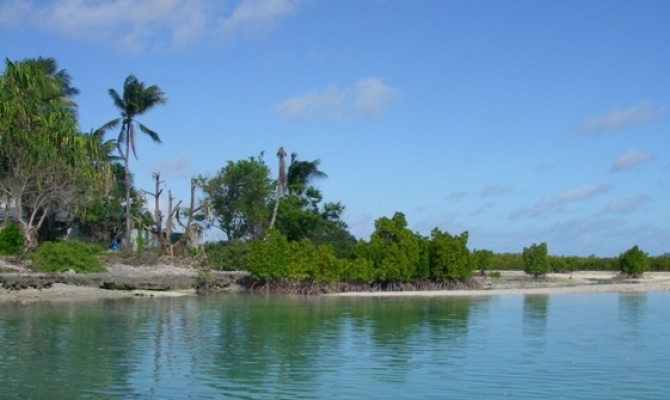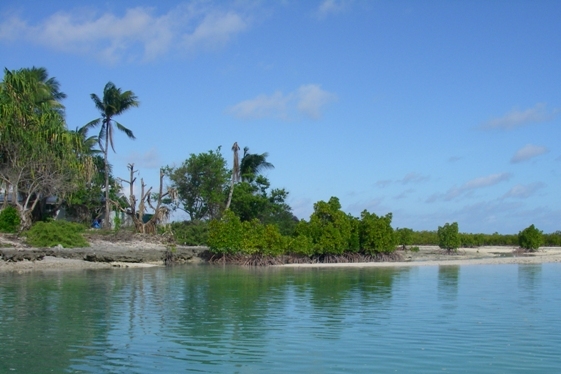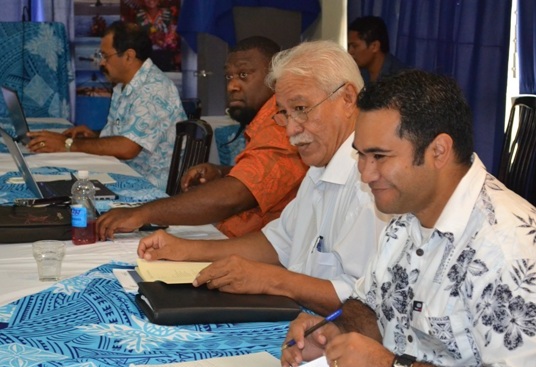
1 March 2012, Apia, Samoa -- Pacific islanders are living with the impacts of climate change, by adapting their way of life to suit the changes.
Pacific communities are seeking innovative ways to have access to water due to lengthier periods of drought or salt water inundation and coastal communities are strengthening their biodiversity or building coastal walls to help protect them against erosion.
Adaptation to climate change is becoming a Pacific way of life.
The Secretariat of the Pacific Regional Environment Programme (SPREP) is embarking on a partnership with the Asia Pacific Adaptation Network (APAN), to help strengthen the adaptation ability of Pacific islands, as well as the ability of Pacific governments to access adaptation funding.
SPREP currently works with Pacific island governments, communities and partners to build their adaptation capacity. This was recognised by APAN who signed a Memorandum of Understanding, cementing SPREP's role of the sub-regional node of the Asia Pacific Adaptation Network in the Pacific.
"Through this partnership with APAN, SPREP has sought to enhance the information resources available to PICs, and in turn highlight Pacific achievements and efforts to a larger community of donors and practitioners in Asia," said Espen Ronneberg, SPREP's Climate Change Adviser.
"APAN will also assist the Pacific with further training opportunities such as this, with an initial focus on adaptation financing, adaptation project formulation and development, and managing information and knowledge resources at the national level."
Established in October, 2009, APAN is part of the Global Climate Change Adaptation Network that has six specific objectives, two of which are to generate and share knowledge and information on adaptation as well as help facilitate access to international adaptation finance mechanisms by developing countries in the region. (Please visit http://www.apan-gan.net for more information on APAN).
 SPREP is leading a wide range of climate change adaptation initiatives in the Pacific. The flagship initiative is the Pacific Adaptation to Climate Change Project (PACC) in 14 different Pacific islands countries and territories that drive country led adaptation activities in the key areas of water resource management, coastal vulnerability and food security. SPREP is also supporting member countries with developing and carrying out appropriate adaptation and disaster risk reduction measures through joint national planning.
SPREP is leading a wide range of climate change adaptation initiatives in the Pacific. The flagship initiative is the Pacific Adaptation to Climate Change Project (PACC) in 14 different Pacific islands countries and territories that drive country led adaptation activities in the key areas of water resource management, coastal vulnerability and food security. SPREP is also supporting member countries with developing and carrying out appropriate adaptation and disaster risk reduction measures through joint national planning.
"This is a good start with SPREP, I think APAN will be very important to strengthen the existing climate change related networks or organisations in Kiribati, we would like to see more participation of these international networks in Kiribati to strengthen our efforts," said Riibeta Abeta, the Climate Change Officer of Kiribati.
A consultation meeting was held earlier this week with SPREP and APAN bringing together climate change focal points and experts from around the Pacific region. The meeting sought to identify the challenges faced by these countries in their adaptation project work, as well as to identify common issues to be prioritised and addressed.
For Haden Talagi, the PACC National Coordinator in Niue, the discussions over the two day meeting have been helpful.
"It has provided me the opportunity to learn from others as well as to understand what's going on and what opportunities there are in terms of capacity for the region."
The consultation meetings will help guide APAN and SPREP in addressing the needs of Pacific island countries with future capacity building activities. The partnership between the two organisations was formalised last year and this year there are plans for more work to take place in the Pacific.
"In the coming year we are going to organise training based on the outputs from these consultation meetings," said Dr. Puja Sawhney, Coordinator of the Regional Hub for Asia Pacific Climate Change Adaptation (APAN).
"Since SPREP is active in the region, it is better placed than APAN to identify the right kinds of training required in the region. That's where SPREP plays a crucial role."
Based in Bangkok, APAN works with 59 countries across the Asia Pacific region through 5 sub regional nodes.
